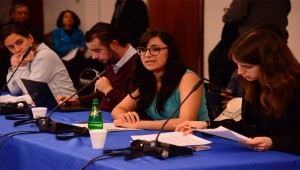
03/24/15 (written by otawka) — In early March, the UN Human Rights Council (UNHRC) released a report by the Special Rapporteur on Torture, Juan E. Méndez, as a result of his investigations in Mexico in 2014. The report was damaging to the Mexican Government, which is already under fire for human rights abuses. Recent events in Mexico, such as the disappearances of the 43 Ayotzinapa students, have brought extra scrutiny and international attention to the Mexican Government’s issues of corruption, forced disappearances, and use of torture by the authorities. In the report, Méndez stated that, “Torture and abuse are widespread in Mexico.” According to the UNHRC, Mexico’s National Human Rights Commission (Comisión Nacional de los Derechos Humanos, CNDH) reported receiving 11,608 complaints of torture and ill treatment between 2006 and April 2014, but civil organizations generally believe that incidents of torture are likely to be significantly higher than the number of cases reported. Méndez links the use of methods of torture such as beatings, rape, water boarding, suffocation, and electric shock to the Mexican Government’s efforts to combat the country’s drug cartels. He indicates that torture is used by Mexican authorities at all levels: local, state, and federal police, and armed forces. Méndez also reports that those detained are tortured in unknown and secret locations, without access to justice and without trial.
Last year, after the original investigation on torture by Méndez, the Peña Nieto administration pointed to a decline in the recommendations handed down by the CNDH regarding the matter as evidence that the situation is improving. Moreover, the CNDH reported a 30% decline in reported cases of torture between 2012 and 2013, crediting its own National Mechanism of Prevention of Torture in Mexico (Mecanismo Nacional de Prevención de la Tortura en México). Méndez acknowledged that this decline could be a result of fewer cases of torture, but stressed that it could also stem from victims’ underreporting of cases due to a lack of confidence in the authorities to respond. In 2012, the Mexican government reported to the U.N. Committee Against Torture that there have been only six verdicts for the offense of torture during the prior seven years. Furthermore, torture charges, when pursued, are often downgraded to charges of abuse of authority, misuse of public office, or unauthorized exercise of public authority.
In response to the release of the report this March, the Mexican government criticized the statements and claims made by Méndez. Jorge Lomonaco, Mexico’s ambassador to the UN and other international organizations, said in response to the report that the statement that torture is widespread in Mexico, “does not correspond with reality.” He also stated that the report by Méndez does not reflect the efforts of the Mexico to combat human rights abuses and that the incidents of torture were limited to a few cases. According to Milenio, this is third time Mexican government officials have criticized the UN’s for its statements about Mexico, including criticisms regarding a report released this February by the Committee on Forced Disappearances.
Méndez underlines the strong correlation between the use of torture and investigation and the fight against organized crime, including the deployment of armed forces to perform law enforcement functions, with the number of military personnel deployed reaching 50,000 in 2012. According to the report, among the cases of torture reported, between December 2012 and July 2014, the CNDH received 1,148 complaints of such violations attributable to the armed forces alone. The use of militarized law in Mexico continues today, with the use of over 32,000 military personnel still perform task usually assigned to civilian forces.

In his report, Méndez stated that torture is an everyday tool used by the authorities in Mexico to obtain confessions from detainees, such as social activists and journalists. Many reported being detained by men in plain clothes, sometimes hooded in unidentified cars and who produced neither warrants nor reason for arrest. Detentions last for days, they allege, often in unknown sites such as military bases. During detention, the whereabouts of those detained are not reported to others nor are detainees presented before judicial or ministerial authorities. The forms of torture allegedly used by Mexican authorities include, beatings, insults and threats, electric shock (usually to genitals), sexual torture primarily against women (including groping, rape, gang rape, and forced nudity, among others), asphyxiation with plastic bag, water boarding, and forced nudity, among others. Some victims died from torture or from extrajudicial killing or forced disappearances that followed the torture.
On March 20, members of civil organizations, such as the Miguel Agustín Pro Juárez Center for Human Rights (Centro de Derechos Humanos, Prodh), presented before the Inter-American Commission for Human Rights (IACHR) in Washington D.C. The organizations reported that there are at least 128 open complaints of sexual torture, which included sexual abuse, rape, rape threats, forced nudity, and use of misogynistic slurs on those detained. One case presented by Prodh was Yecenia Armenta, who was allegedly sexually tortured for 15 hours and was forced to confess to the murder of her husband. She was then detained for the two years in a correctional facility in her home state of Sinaloa. During the press the conference after the session ended, the civil organizations were outraged when the Assistant Attorney of Human Rights of Mexico’s Attorney General’s Office (Procuraduría General de la República, PGR) stated that they did not agree that the theme of the session was “sexual torture,” and asked that the terminology be changed to “sexual violence.” Some, including Prodh human rights attorney Araceli Olivos, believed it was a way for the Mexican government to evade the problem and not provide answers to state mandated acts of sexual torture.
One survivor of torture in Mexico, Claudia Medina, who is now a face of Amnesty International’s Stop Torture campaign and was among those women who denounced sexual torture in D.C. in March, spoke on her experience of being sexually assaulted while tortured in Mexico. Members of the Mexican Navy (Secretaría de la Marina, SEMAR) detained Medina in August 2012 in Veracruz, where she was tortured to get a confession incriminating herself and others for drug-related crimes. In February 2015, the last remaining charges against Medina were dropped and her claim of torture is now before the Federal Attorney General’s Office (PGR). “After this long process I had to go through I felt the need to become a human rights activist, to show that I’m not a criminal, as authorities portrayed me,” stated Medina. “I will not allow even one more woman to be tortured in Mexico.”
Sources:
“UN Human Rights Visitor Comments on Torture in Mexico.” Justice in Mexico. May 31, 2014.
“ONU: torturas y malos tratos “generalizados” en México.” La Jornada. March 9, 2015.
Alcántara, Liliana. “UN says that torture is generalized in Mexico.” El Universal. March 10, 2015.
Jiménez, Eugenia. “México y ONU ahora chocan por informe sobre la tortura.” Milenio. March 10, 2015.
“Denuncian ante la CIDH tortura sexual a mujeres mexicanas.” teleSUR. March 20, 2015.




